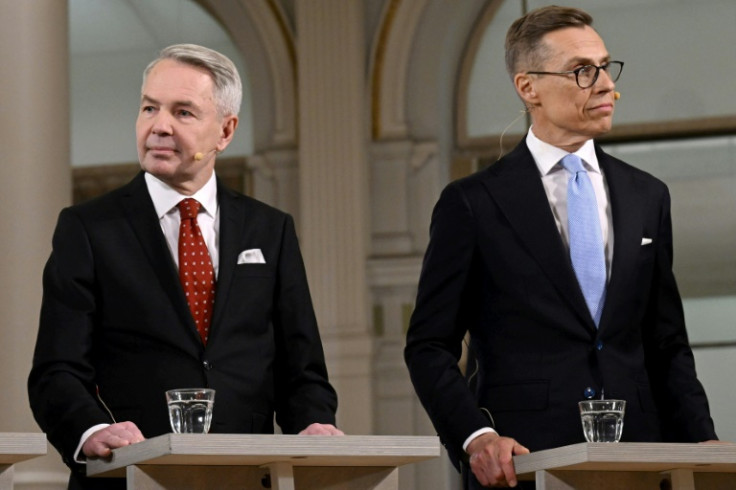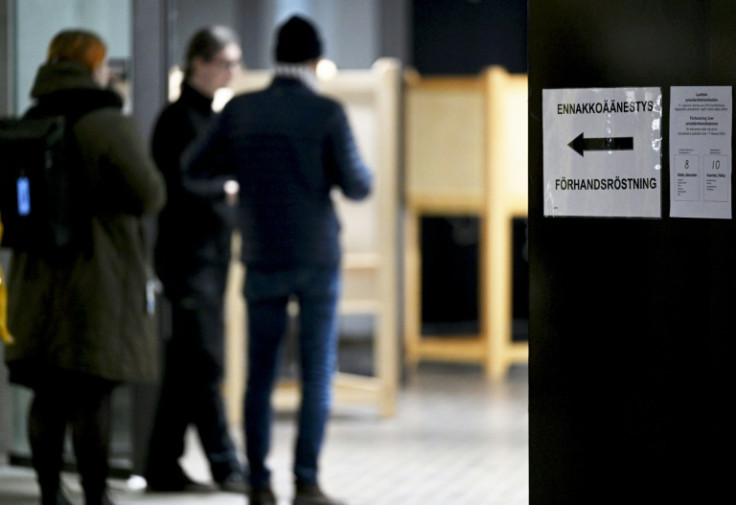
Two seasoned politicians face off in Finland's presidential election on Sunday, with the president's role having gained importance in light of the country's NATO membership and rising tensions with neighbouring Russia.
Some 4.3 million voters will have to choose between former conservative prime minister Alexander Stubb and ex-foreign minister Pekka Haavisto, a Green Party MP running as an independent.
The changing geopolitical landscape in Europe will be the main concern for the new head of state, who -- while having limited powers compared to the prime minister -- leads the country's foreign policy together with the government and also acts as supreme commander of Finland's armed forces.
Relations between Moscow and Helsinki deteriorated following Russia's 2022 invasion of Ukraine, prompting Finland to drop decades of military non-alignment and join NATO in April 2023.
Russia, with whom Finland shares a 1,340-kilometre (830-mile) border, swiftly warned of "countermeasures".
"The fact that we've just joined NATO has a lot of significance because the building of the NATO institution in Finland and what it will look like will largely be a task for the new president," Theodora Helimaki, doctoral researcher in political science at the University of Helsinki, told AFP.
"The top two were perhaps the most experienced in terms of foreign policy," she added regarding the first round.
Stubb came out ahead in the first round on January 28 with 27.2 percent of votes, while Haavisto came in a close second with 25.8 percent of the vote -- qualifying them for the second round.
An opinion poll by public broadcaster Yle published on Thursday saw Stubb getting 54 percent of the vote, compared to 46 percent for Haavisto.
In the post-Cold War period, Helsinki maintained good relationships with Moscow.
Outgoing president Sauli Niinisto, first elected in 2012, once prided himself on his close ties with Russian President Vladimir Putin before becoming one of his most trenchant critics.
Niinisto contacted him directly to announce the decision to join NATO.
Since then, there has been radio silence and neither candidate is expecting a phone call from the Kremlin if they win the election.
In August 2023, Finland observed an influx of migrants entering through its eastern border without visas.
Helsinki claimed Moscow was pushing the migrants to destabilise it, and in response closed their border in November -- a move supported by both candidates.
Stubb and Haavisto, who have both served as foreign minister, share similar visions for the country's position towards Russia, calling for additional sanctions against Moscow and support for Ukraine.
"The European Union can do much more to help Ukraine," Haavisto said during a televised debate on Thursday evening.
"Ukraine's road is our road, and at the moment they are fighting for the freedom of Europeans. They deserve all the support that we can give to them," Stubb agreed.
For Helimaki, the differences between the candidates come down to nuance on certain issues, such as the storage or transport of nuclear weapons in Finland.
Haavisto does not want them on Finnish soil though he recognises that as a member of NATO, the Nordic country must take part in exercises relating to the alliance's nuclear policy.
Stubb meanwhile feels that the country should not exclude "any part" of NATO's nuclear deterrence.
Given the lack of significant foreign policy differences, voters are likely to make their decision based on their political preferences, according to Matti Pesu, leading researcher at the Finnish Institute of International Affairs.
"While Stubb's liberalism is related to western organisations and western values, Haavisto has more of a global emphasis: the UN, peace, development," Pesu told AFP.
When it comes to personality, Stubb comes across as a "kind of modern politician and fairly open in how he talks", while Haavisto "is a more traditional, more careful Finnish politician."
Voter turnout in the first round was 75 percent and polling stations open at 9:00 am local time (0700 GMT) and close at 8:00 pm (1800 GMT).








